Prescriptions for dementia-specific medications
While there is currently no known cure for dementia, there are 4 medications available under the Pharmaceutical Benefits Scheme (PBS) and Repatriation Pharmaceutical Benefits Scheme (RPBS, available for eligible veterans, war widows/widowers and their dependants) that may assist in managing dementia symptoms and slow dementia progression. In Australia, these medications are currently only subsidised for people with a diagnosis of Alzheimer’s disease (see Box 8.1).
Box 8.1: Dementia-specific medications
There are 4 dementia-specific medications – Donepezil, Galantamine, Rivastigmine and Memantine – currently subsidised under the PBS and RPBS. These medications can be prescribed to patients with a confirmed diagnosis of Alzheimer’s disease made by (or in consultation with) a specialist or consultant physician under specific clinical criteria (Drug Utilisation Sub-Committee 2016). In order to continue treatment, patients must demonstrate a clinically meaningful response to the treatment. This may include improvements in the patients’ quality of life, cognitive function and/ or behavioural symptoms.
Three of the medications (Donepezil, Galantamine and Rivastigmine) are acetylcholinesterase inhibitors. These types of medications work by blocking the actions of the enzyme acetylcholinesterase, which destroys acetylcholine—a major neurotransmitter for memory.
The Therapeutic Goods Administration (TGA) note the following therapeutic indications for each medication:
- Donepezil: indicated for the treatment of mild, moderate and severe Alzheimer’s disease.
- Galantamine: indicated for the treatment of mild to moderately severe Alzheimer’s disease.
- Rivastigmine (as hydrogen tartrate): indicated for the treatment of patients with mild to moderately severe Alzheimer’s disease.
- Rivastigmine (as EXELON PATCH): indicated for the treatment of patients with mild, moderate and severe Alzheimer’s disease.
The use of these medicines may lead to increased communication between nerve cells and slow dementia progression (Dementia Australia 2020). Research suggests that these medicines may also benefit people with Lewy body dementia and dementia associated with Parkinson's disease (Noufi et al. 2019), however, these medications are not subsidised in Australia for treating these types of dementia.
Memantine is approved in Australia for the treatment of symptoms of moderately severe to severe Alzheimer’s disease (Drug Utilisation Sub-Committee 2016). It works by blocking the neurotransmitter glutamate, which causes damage to brain cells and is present in high levels in people with Alzheimer’s disease (Dementia Australia 2020).
This page will be updated to include any future medications that become approved for use and included in the PBS.
This section focuses on dispensing patterns of dementia-specific medications supplied under the PBS and RPBS, as well as a profile of the people who were dispensed scripts for these medicines. As dementia is a condition that primarily affects older people, analyses were limited to prescriptions dispensed to people aged 30 and over. This age limit is consistent with the lower age limit of dementia prevalence estimates for Australia.
It is important to note that information on medication intake and adherence to medication plans is not available. The data presented here relate only to prescriptions dispensed. In addition, the PBS and RPBS do not contain data on dispensing of privately prescribed medications (prescriptions that are not eligible for subsidy under the PBS or RPBS), medications to public hospital in-patients and over-the-counter medications.
Over 658,000 prescriptions were dispensed for dementia-specific medications in 2021–22
In 2021–22, there were over 658,000 prescriptions dispensed for dementia-specific medications to just under 68,700 Australians with dementia aged 30 and over (Figure 8.1). This is equivalent to 9.6 scripts per person who was dispensed a script for a dementia-specific medication in 2021–22. Each script is usually for a month’s supply of medicine.
Among those who were dispensed scripts for dementia-specific medications in 2021–22:
- 43% were men (29,500 men) and 57% were women (39,200 women)
- 1 in 3 people were aged 85 or over
- on average, men were dispensed 9.5 scripts per person and women were dispensed 9.7 scripts per person
- older people were dispensed more scripts on average – increasing from 8.9 scripts per person among those aged under 65 to 9.7 scripts per person among those aged 85 and over.
Figure 8.1: Dementia-specific medications by age and sex in 2021–22: (a) number of prescriptions dispensed and (b) number of people who were dispensed scripts and average number of scripts dispensed, per person
Figure 8.1 shows two graphs on prescriptions dispensed for dementia-specific medications to people aged 30 and over by age and sex in 2021-22. The first is a bar graph showing the number of scripts dispensed by age group. The second is a bar and line graph, with the bar graph showing the number of people who were dispensed scripts for dementia-specific medications and the line graph showing the average number of scripts dispensed per person, both broken down by age groups. The number of prescriptions dispensed, the number of people dispensed scripts and the average number of scripts dispensed per person all increased with age. A greater number of women were dispensed a greater number of scripts than men.
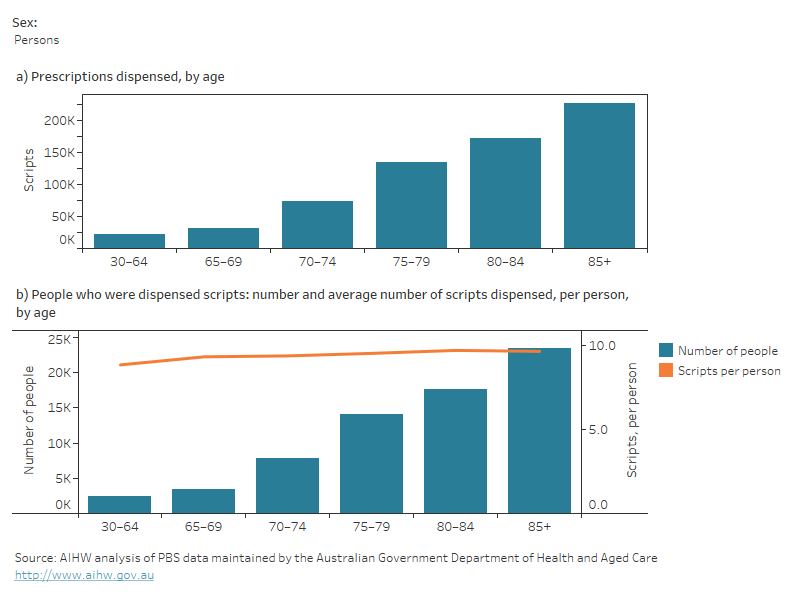
Trends in prescriptions for dementia-specific medications dispensed over time
There was a 29% increase in the rate of scripts dispensed for dementia-specific medications to Australians aged 30 and over between 2012–13 and 2021–22. There was a greater increase in the number of scripts dispensed to men (38%) than women (22%) (Table S8.2).
Figure 8.2: Scripts dispensed for dementia-specific medications: crude rate by sex between 2012–13 and 2021–22
Figure 8.2 is a line graph showing the crude rate of people who were dispensed scripts for dementia-specific medications by sex between 2012–13 and 2021-22. The rate of people who were dispensed scripts for dementia-specific medications increased slightly from 3.2 people per 100 population in 2012–13 to 4.1 people in 2021-22. The rate of women dispensed scripts was slightly higher than for men each year, but the increase over time was similar for both men and women.
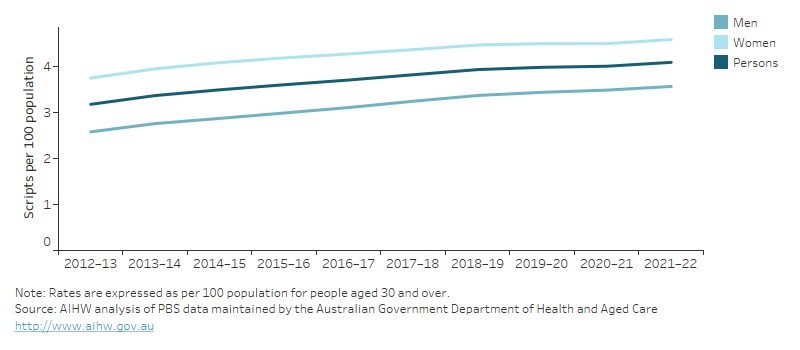
Donepezil was the most commonly dispensed dementia-specific medication
Donepezil was the most commonly dispensed dementia-specific medication in 2021–22, accounting for over 433,000 prescriptions or 66% of all scripts dispensed for dementia-specific medications (Figure 8.3). Each of the other dementia-specific medications (Rivastigmine, Memantine and Galantamine) accounted for between 10-12% of all scripts dispensed.
Women were dispensed a greater number of scripts than men for each of the 4 dementia-specific medications. Donepezil was the most commonly dispensed medication in each age group in both men and women. Rivastigmine was the second-most commonly dispensed medication to men and women in most age groups under 85. For people aged 85 and over, Memantine was the second-most dispensed medication.
Figure 8.3: Dementia-specific medications, by medication type and sex in 2021–22: (a) percentage of all scripts dispensed by medication type and (b) number of scripts dispensed by medication type and age
Figure 8.3 shows two graphs on the prescriptions dispensed for dementia-specific medications, by the four types of dementia-specific medications and sex in 2021-22. The first graph is a stacked bar graph showing the percentage of all scripts dispensed by medication type. The second graph is a stacked bar graph showing the number of scripts dispensed by medication type and age. Around two-thirds of prescriptions dispensed for dementia-specific medications were for Donepezil, and this was the most commonly dispensed medication in each age group in both men and women. Women were dispensed a greater number of scripts than men for each of dementia-specific medication.
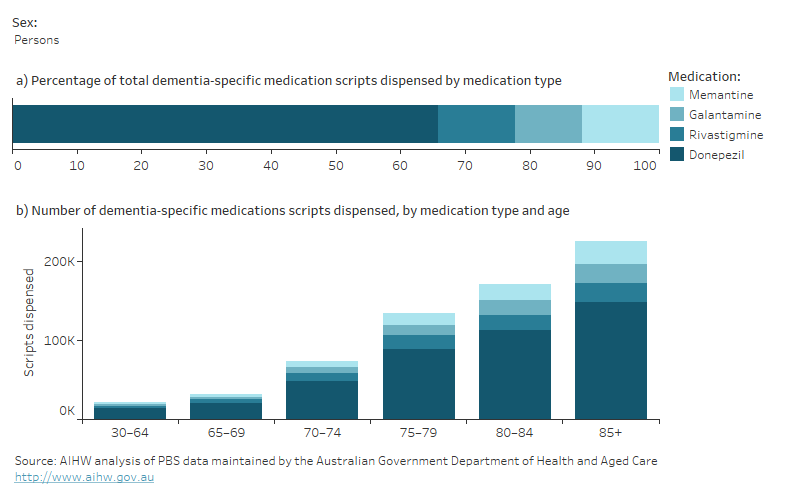
Differences by state and territories
The number of people who were dispensed scripts for dementia-specific medications per 1,000 people varied by state and territory in 2021–22, but was consistently higher among women than men in each state and territory. In Australia overall, there were 4.3 people dispensed scripts for dementia-specific medications per 1,000 people.
The rates of men and women who were dispensed scripts for dementia-specific medications were lowest in the Northern Territory (0.5 and 0.6 people per 1,000 men and women, respectively). The highest rates among men and women were in the Australian Capital Territory (4.7 and 5.6 people per 1,000 men and women, respectively), followed by New South Wales (4.3 and 5.1 people per 1,000 men and women, respectively) (Figure 8.4).
It is important to note that drugs distributed by the government’s Remote Area Aboriginal Health Services (RAAHS) program are not included in PBS data. This may be a factor in the Northern Territory’s low dispensing rates.
Figure 8.4: People who were dispensed scripts for dementia-specific medications in 2021–22: crude rate by sex and state/territory
Figure 8.4 is a bar graph showing the crude rate of people who were dispensed scripts for dementia-specific medications by sex and state and territory in 2021-22. The rates of men and women who were dispensed scripts for dementia-specific medications were lowest in the Northern Territory and highest in the Australian Capital Territory.
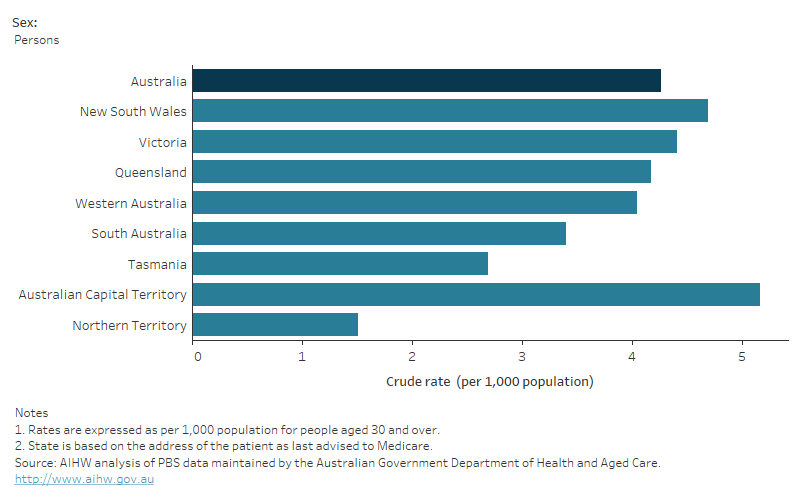
1 in 4 people who were dispensed scripts for dementia-specific medications, were dispensed these medications for the first time
In 2021–22, 1 in 4 people (24% or over 16,400 people) who were dispensed scripts for dementia-specific medications were dispensed these medications for the first time (Table S8.5). The proportion who were dispensed scripts for dementia-specific medications for the first time varied by age: 1 in 3 people (34%) aged under 65 were dispensed this for the first time (Figure 8.5). This decreased to almost 1 in 5 people (18%) among those aged 85 and over.
Among those who were dispensed scripts for dementia-specific medications for the first time, the most commonly dispensed type of medication received throughout the year was Donepezil (69%), followed by Rivastigmine (14%), Memantine (11%) and Galantamine (6.8%) (Table S8.6).
Figure 8.5: People who were dispensed dementia-specific medications for the first time in 2021–22 by sex: percentage by age
Figure 8.5 shows a bar graph displaying the percent of people who were dispensed prescriptions for dementia-specific medications for the first time by age and sex in 2021-22. The proportion who were dispensed scripts for dementia-specific medications for the first time decreased with increasing age.
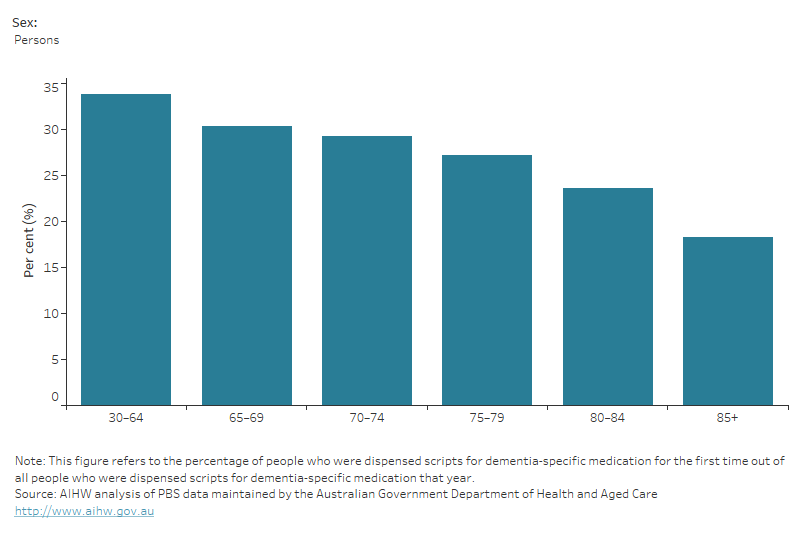
Drug Utilisation Sub-Committee (2016) Medicines for Alzheimer disease, PBS website, accessed 10 July 2023.
Dementia Australia (2020) Drug treatments & dementia, Dementia Australia website, accessed 10 July 2023.
Noufi P, Khoury R, Jeyakumar S and Grossman GT (2019) 'Use of Cholinesterase Inhibitors in Non-Alzheimer’s Dementias', Drugs & Aging, 36:719–731, doi:10.1007/s40266-019-00685-6.


